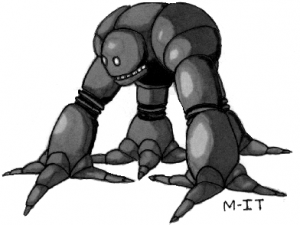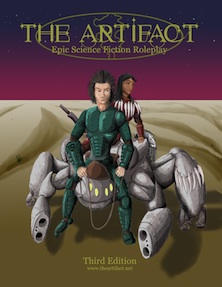 There are other kinds of conflict in RPGs but social conflict is sometimes viewed as unsupported by the rules of an RPG. Rules for social conflict may also make players and GMs uncomfortable because it may mean that a player has to act out that they loose control of their character. For example, if Darth Vader had won the social conflict when he tried to get Luke to join him, doesn’t that mean that Luke would now go help his dad rule the galaxy as father and son? If you were playing Luke in an RPG and you lose the conflict, that would usually be the conclusion by most players and GMs. I actually would venture to say Vader did win the conflict. Luke just took a third path, he gave up in a way he found acceptable.
There are other kinds of conflict in RPGs but social conflict is sometimes viewed as unsupported by the rules of an RPG. Rules for social conflict may also make players and GMs uncomfortable because it may mean that a player has to act out that they loose control of their character. For example, if Darth Vader had won the social conflict when he tried to get Luke to join him, doesn’t that mean that Luke would now go help his dad rule the galaxy as father and son? If you were playing Luke in an RPG and you lose the conflict, that would usually be the conclusion by most players and GMs. I actually would venture to say Vader did win the conflict. Luke just took a third path, he gave up in a way he found acceptable.
The trick is to give the player who has lost the conflict a few options. This way they can lose and keep some control of their character. So how can this be modeled?
I Don’t Believe It
A communication attack can come in two forms, intellectual and social. An intellectual attack is an argument based on facts, they may be disputed facts but facts none the less. In this kind of attack the defender can choose to defend themselves with their own knowledge or simply refuse to believe the facts being presented. In this situation an intelligence (I.Q. attribute) test would be made and the opposing side would make a defending roll vs. their intelligence (I.Q.) or their willpower (Psyche) (player’s choice).
In a social attack, the argument is based on persuasive arguments that undoubtably have some facts associated with them but are based on value judgements. This kind of attack is based on how convincing the argument is made. This is best modeled by a Charisma test (plus skills like Bluffing, Command and Persuasion and defended against by an intelligence (I.Q.) or willpower (Psyche) test. This would usually be the player’s choice, but in some arguments the GM could rule it would have to be one or the other.
Yes, But!
When people argue about something they feel strongly about and one person persuasively makes a point, the opposing person rarely will say “Oh I guess I was wrong, you win.” The fact is that it usually makes them more upset. Their further arguments may be more constrained than they were before in their logic though. So in other words, their stress level goes up and their ability to argue or defend their viewpoint gets weaker.
This would suggest a level of social hit points of some kind and some games have gone with this kind of a mechanic. I would suggest against a Social HP though for the sake of simplicity. Adding another accounting task is not really what players usually want but it’s on the right track. Instead, I suggest a system that counts up instead of down. What’s the difference? When you have a social HP you have to track the value even when it’s not used. It also means that something happens when you count down to zero.
What we in fact want is a system that shows a level of stress that the person is under that counts up (Hey we already have that in the Fraction Column system, Stress Points) and tie negative consequences to those points building up. This way, the player gets to decide when they’ve been beat up enough to start agreeing or to bow out. Another good option is to have the stress degrade the character’s ability to attack and defend. For the Fraction Column system each successful attack (the attacker wins the contest) should inflict one Stress Point. Each Stress Point would act as a CDF (Character Difficulty Factor, a negative skill modifier) against the character’s IQ, Charisma and Psyche. There are other repercussions to Stress Points and those would stay as they are stated in the book. Once the Stress Points overwhelm the character’s ability to argue, they’re reduced to physically running away, screaming or violent outbursts.
Stalling
Another option that the player has is to stall. What this means is that the character just stops arguing, perhaps stating that they aren’t going to discuss the matter anymore. By making this move, the character is tacitly admitting defeat socially but not intellectually. The character stalling takes two stress points but does not take any more in this conflict. The hope is that once they have lowered their stress points, they can take up the argument again.
Okay I Give
At some point, someone should be compelled to give in. When this happens there is a resolution to the conflict. The winner is vindicated and the loser is, strangely, relieved. When this happens the winner gets to drop all but one of the Stress Points they accumulated in the conflict. The character that concedes keeps half of their stress points. This gives an incentive to win but also gives an incentive to end the argument to relive social pressure.
We’ve used the opposing rolls method of social conflict but we haven’t used Stress Points in this way before. I got the idea for this from the Social Combat post over at Reality Refracted. I like recycling components that already exist, so I’m excited to have these systems mesh together like this. What do you think?


 The Free RPG Blog
The Free RPG Blog